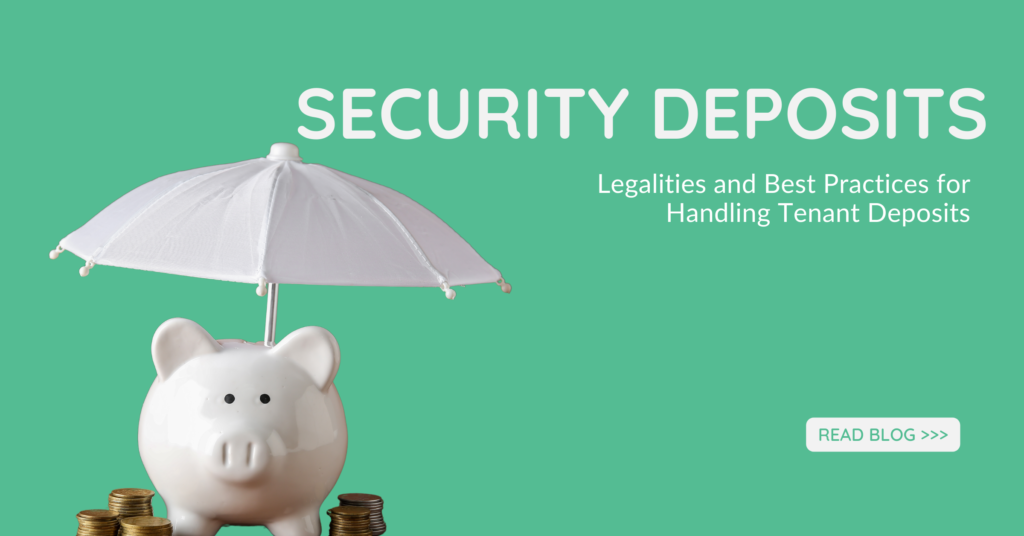Security Deposits: Legalities and Best Practices for Handling Tenant Deposits
Reading Time: 3 minutesSecurity deposits are a crucial part of the rental landscape, providing financial protection for both landlords and tenants. However, navigating the legalities and best practices surrounding security deposits can sometimes lead to misunderstandings. This article explores the legal framework, best practices for landlords and tenants, and how clear communication and documentation can ensure a smooth…

Security deposits are a crucial part of the rental landscape, providing financial protection for both landlords and tenants. However, navigating the legalities and best practices surrounding security deposits can sometimes lead to misunderstandings. This article explores the legal framework, best practices for landlords and tenants, and how clear communication and documentation can ensure a smooth process.
Table of Contents
Understanding the Legal Landscape
The world of security deposits is governed by a complex web of federal and state laws. While there are no federal regulations on security deposits, most states have established guidelines that dictate the maximum amount a landlord can charge, acceptable uses of the deposit, and the timeframe for returning it to the tenant after move-out.
To ensure compliance, it’s essential to research your state’s specific security deposit laws. Resources like [state tenant landlord handbook] or local landlord-tenant organizations can provide valuable guidance.
Best Practices for Landlords

- Setting the Deposit Amount:
Landlords should adhere to state or local limits on security deposits. They can also consider factors like the monthly rent and property type when determining a reasonable amount. - Collecting the Deposit: It’s advisable to collect the security deposit at lease signing and provide a detailed receipt outlining the amount, date, and purpose of the deposit. Acceptable forms of payment can include cash, certified checks, or money orders to minimize the risk of bounced checks. Electronic payments can also be a convenient option for both parties.
- Move-In and Move-Out Inspections:
Conducting thorough inspections with detailed documentation (photos and checklists) is crucial. Landlords should note any pre-existing damage before the tenant moves in to avoid disputes later. - Returning the Deposit:
Timely returns are essential. Landlords must follow the legal timeframe dictated by their state. If deductions are made for repairs or cleaning, they should be clearly itemized with receipts for the work performed.
Best Practices for Tenants

Tenants should:
- Understand their rights regarding security deposits according to their state’s laws.
- Request a move-in inspection and document the property’s condition with photos and checklists.
- Maintain the property in good condition throughout their tenancy according to the lease agreement.
- Provide a forwarding address to ensure a smooth return of the deposit.
- Follow legal procedures to contest deductions they believe are unfair.
Communication and Documentation are Key
Clear communication and thorough documentation are vital throughout the tenancy, especially regarding security deposits. By understanding the legalities and following best practices, both landlords and tenants can navigate the security deposit process effectively and minimize the potential for disputes.
At Green Ocean Property Management, we understand the importance of clear communication and following proper procedures when handling security deposits. Our team of experienced property managers is well-versed in state and local security deposit laws. We can guide you through the process, ensuring a smooth and stress-free experience for both landlords and tenants.
Contact Green Ocean Property Management today to learn more about our comprehensive property management services. We can help you navigate the complexities of security deposits and ensure a successful rental experience.
Rental Tips for International Students and Workers
Reading Time: 3 minutes Are you planning to rent your place to international students and workers? Below are some tips and forms needed to be able to do so. Forms needed during the application process A person who wants to study or work in the United States would need to apply to either their school…
Why A Property Manager Should Process Leases Everyday
Reading Time: 2 minutes When it comes to leasing your property, our top priority is to minimize the chance of vacancy. In this article, we emphasize why it is important to process leases every day of the week. That way, you can close deals with prospective renters and ensure that your property is always filled. Here are…
How to Maintain and Improve Your Cash Flow
Reading Time: 2 minutes Your investment property is probably one of the most expensive assets that you have. You may have bought it or kept it because you want to make money out of it. But managing an investment property requires a lot of planning and budgeting. At the end of the day, you need to know your…








